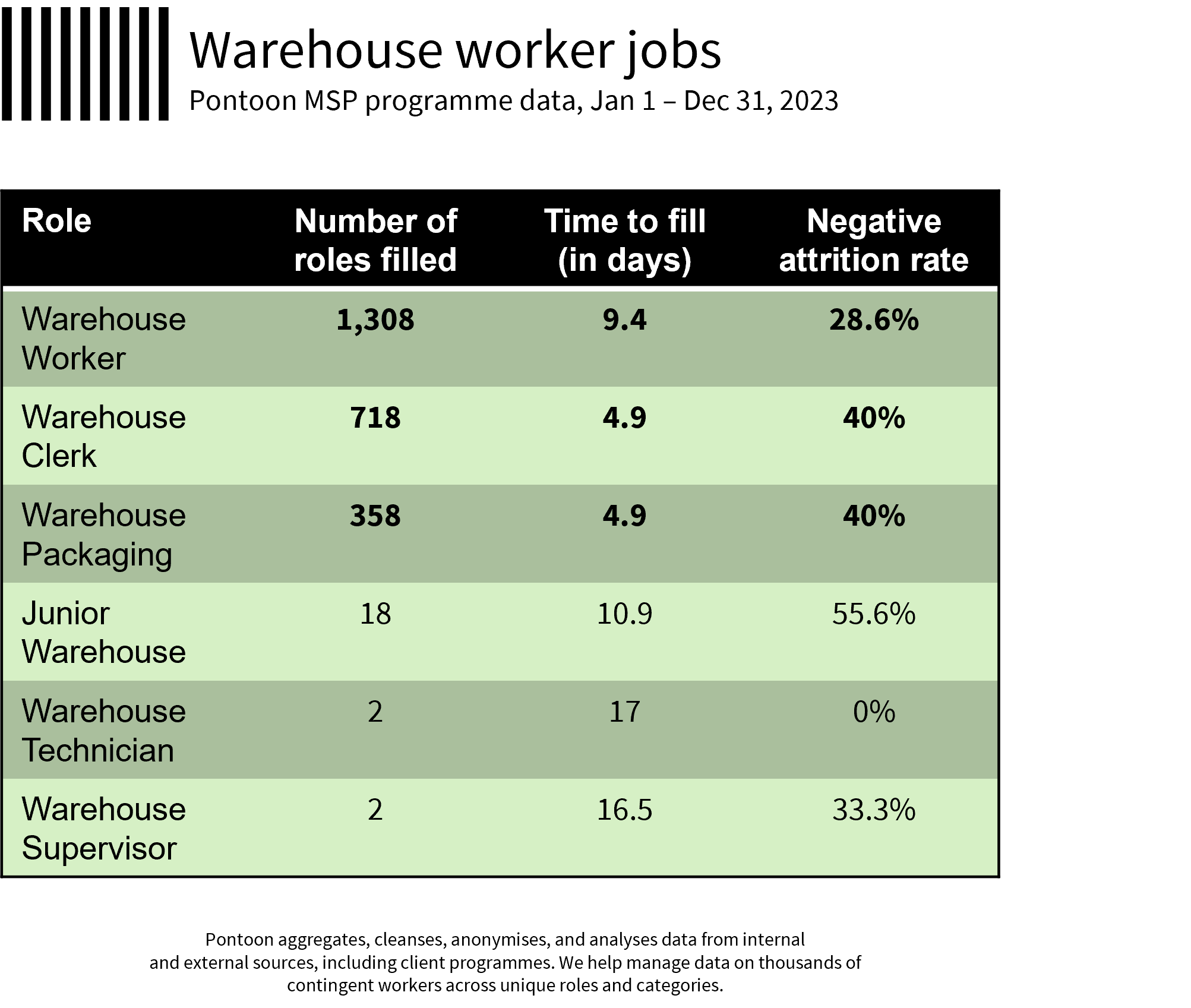Warehouse staffing remains a prominent challenge. Employees are advocating for more flexible schedules and additional benefits. At the same time, the increase in online shopping has placed unprecedented pressure on fulfilment and distribution centres. These factors have resulted in a scarcity of talent that is affecting warehouse managers globally. While the warehouse robotics market is projected to reach $16 billion in value by 2030 as companies invest in technology, the demand for warehouse workers still persists.
In 2023, our clients were mostly seeking temporary Warehouse Workers. This contingent job category represented over 54% (n=1,308) of all 2,406 warehouse roles, followed by Warehouse Clerk at nearly 30% (n=718) and Packaging at 15% (n=358). The latter two had the fastest time-to-fill rates of under 5 business days. The time to fill for Warehouse Workers was almost twice as long (9.4 days), but this role had a significantly lower negative attrition rate of 28.6%. Results for more specialised roles like Warehouse Technician and Warehouse Supervisor are perhaps not statistically relevant due to the marginal numbers of these specific roles filled as part of our Managed Service Provider (MSP) programmes. However, it can be safely estimated that time-to-fill rates for supervisors and technicians are generally longer, taking more than three weeks.
Reducing turnover with fair chance employment
The consumer products sector grapples with a shortage of qualified professionals and high turnover. Voluntary turnover takes a heavy toll on businesses, with an estimated annual cost of $1 trillion in the United States alone. Second-chance hiring offers a promising solution to both talent shortages and attrition challenges.
In the United States, an untapped talent pool of around estimated 77 million potential workers—1 in 3 adults with criminal records—offers consumer product companies a unique opportunity. By embracing second-chance (or fair chance) hiring, these companies can not only fill vacancies but also champion social responsibility, turning a challenge into a strategic advantage.
Employing individuals with prior criminal histories fosters increased loyalty and contributes to lower turnover rates as individuals are provided with opportunities for career advancement and personal growth.
Additionally, the cost of replacing an employee can range from half to double their compensation, making second-chance hiring a financially prudent choice for companies looking to mitigate turnover costs.
How can your company become a fair chance employer?
Assess applicants based on skills: Enhance workforce diversity by reevaluating the need for background checks in specific roles. Partner with talent providers to optimise hiring efficiency.
Lend a helping hand: Support job seekers through initiatives like transportation assistance and partnerships with community organisations. Use government grants and resources to help offset the cost of re-entry support.
Start small: Hire one or two candidates with criminal records to gain hands-on experience and start addressing your staffing challenges.
In conclusion, mitigating the risk of talent shortages in the consumer products sector requires innovative approaches. By embracing inclusivity and social responsibility through fair chance employment, businesses can not only fill critical roles but also foster a more diverse and resilient workforce.
Hiring trends in plant-based food manufacturing
The plant-based food market is experiencing notable growth, driven by health consciousness, environmental considerations, and evolving consumer preferences. In the US, the plant-based food market is predicted to reach US$ 19.07 billion in value by 2030, expanding at a compound annual growth rate (CAGR) of 11.54% from 2024 to 2030.
The global shift towards plant-based diets is also reshaping the job market within the food manufacturing industry. Recent data reveals significant shifts in hiring patterns, reflecting the growing demand for plant-based food products. Last year, there was a remarkable 17% surge in job postings related to plant-based products. For businesses looking to stay ahead, understanding and adapting to this demand by seeking out skilled workers and alternative sourcing strategies is crucial.
According to Just Food, management occupations emerged as the focal point of plant-based diets-related hiring activity, constituting 15% of all new job postings in Q3 2023. Production occupations closely followed, witnessing a substantial 33% increase in new job postings, highlighting the growing demand for skilled workers in manufacturing. Sales and related occupations, along with office and administrative support, each accounted for a 9% share of new job postings, underscoring the diverse skill sets required within the industry.
Furthermore, the dominance of key players in the market is evident, with the top five consumer products companies—Kellogg, Bonduelle, Body Shop International, AAK, and Beyond Meat—accounting for a remarkable 80% of all plant-based diets-related new jobs in the industry.
While the United States continues to lead in hiring activity, capturing 63.51% of total new job postings in Q3 2023, other regions such as Canada and the UK also witness notable traction, indicating a global shift towards plant-based production.
Hiring talent for plant-based food production: Pontoon’s recommendations
Focus on skill sets: Identify the skills needed in your organisation, e.g. food science expertise for product development, supply chain management skills for logistics, or marketing proficiency for promoting plant-based products.
Underscore sustainability: Highlight your company’s commitment to sustainability and environmental stewardship to attract candidates who share these values. Showcase initiatives such as reducing carbon footprint, using eco-friendly packaging, and sourcing ingredients responsibly.
Offer training and development: Invest in training programmes to upskill existing employees and attract talent from diverse backgrounds. Consider offering opportunities for professional development in areas such as plant-based nutrition, food technology, and sustainable agriculture.
Seek feedback and adapt: Continuously solicit feedback from current employees and candidates to refine your hiring process and employer brand. Stay agile and adaptable in response to changing market dynamics and evolving candidate preferences.
Contact Us





